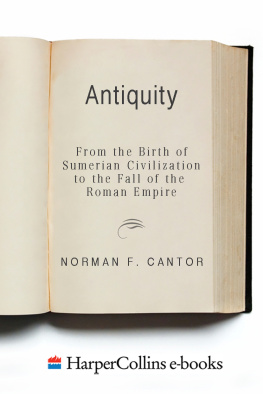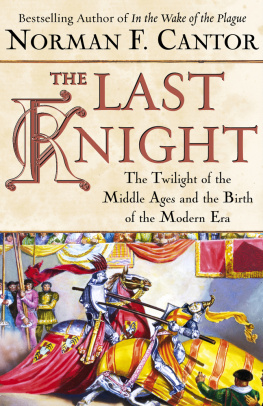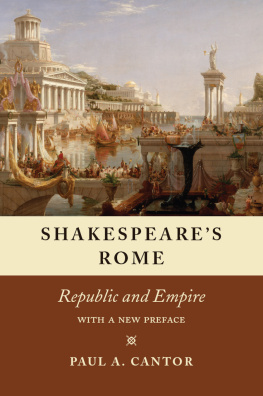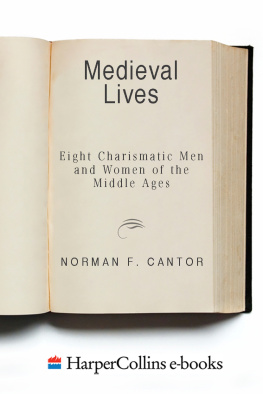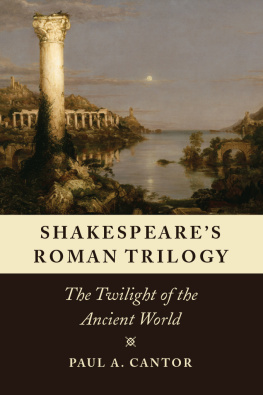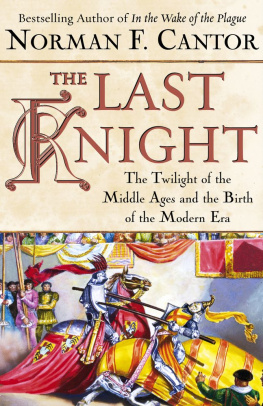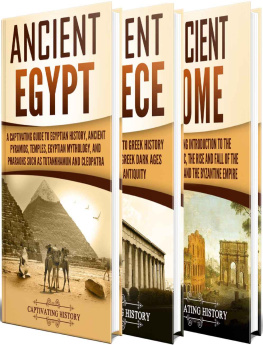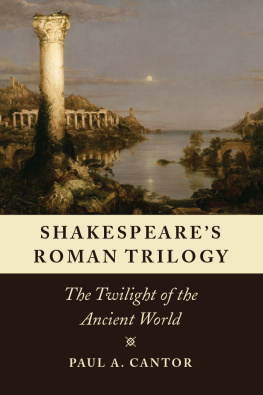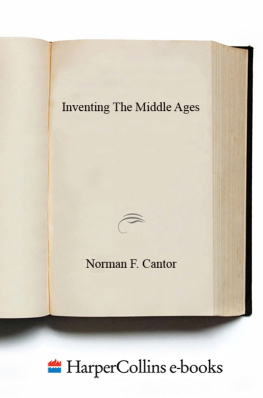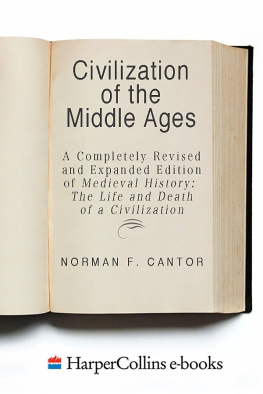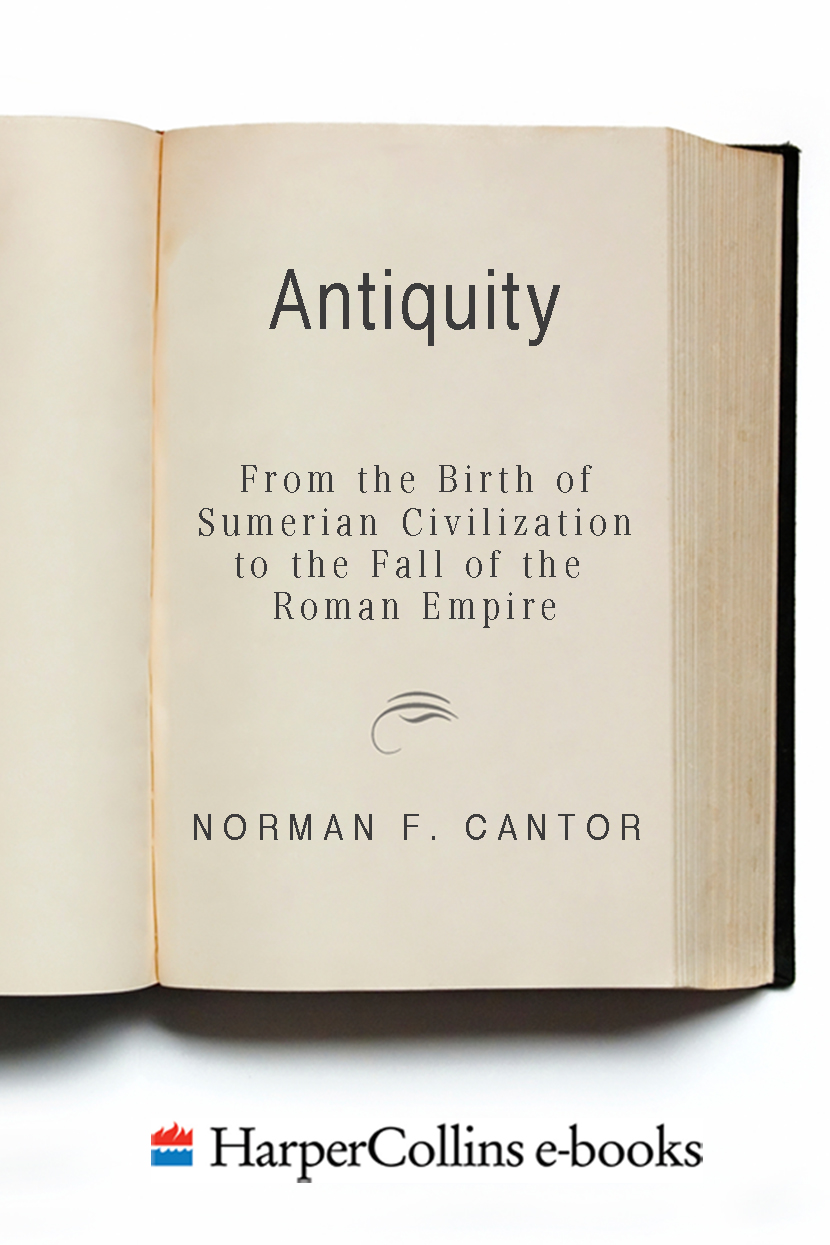Contents
Guide
The Civilization of the Middle Ages
Western Civilization
Inventing the Middle Ages
Medieval Lives
The Sacred Chain: The History of the Jews
Imagining the Law
In the Wake of the Plague
Inventing Norman Cantor
This book is an attempt to communicate to the educated reader and to students of history some basic knowledge about antiquity from 2.5 million years agothe dawn of humanityto the fall of the Roman Empire in the fifth century A.D. I have tried to convey this long history in simple language, keeping names, places, and dates to a minimum, and focusing on the Mediterranean and Western Europe.
Part I, Basic Narrative, lays out the fundamental knowledge about antiquity that every educated person should possess.
Part II, Societies and Cultures, focuses in more detail on the most important aspects of antiquity.
I have used the conventional, European Christian dating of B.C. (Before Christ) and A.D. (Anno Domini, in the year of the Lord) rather than B.C.E. (Before the Common Era) and C.E.not for religious reasons, but simply because that is what most readers are familiar with.
The modern and recent historical literature on antiquity is vast in size. There are at least three thousand volumes in English worth reading on the ancient world. The weakness of this literature is that it is often too academic and technical to be accessible to the lay reader and beginning student.
Time and again authors fail to take pains to write in readable style. Since 1960 there has been a marked tendency to avoid highly interpretive works, and to write with focus on detailed information. Few people have the time and educational background to plow through these densely learned volumes.
Part of the problem is that surveys of ancient history are no longer offered in many respectable American colleges, so the market for introductory works and textbooks is very small.
Another problem arises from Britain where many writers on antiquity have been studying Greek and Latin since they were five years old, and presuppose fluency in the classical languages. A famous case is that of a British historian of the Roman Empire, now holding a chair at Yale, who published a thick study of a fourth-century-A.D. Roman historian but did not translate the Latin quotations.
The following books offer many hours of pleasure and high education. These recommendations focus on recent publications. Readability is noted.
PREHISTORY
There is a gap of 2.5 million years between the emergence of recognizable humans in East Africa and the appearance of literate civilizations in the Nile and Tigris-Euphrates valleys around 3500 B.C. What is known from archaeological data about this period of so-called prehistory is summarized in Colin Tudge, The Time Before History (New York: Scribner, 1996), Donald Johnson and Blake Edgar, From Lucy to Language (New York: Simon and Schuster, 1996), and Virginia Morrell, Ancestral Passions (New York: Simon and Schuster, 1995), a fascinating biography of the famous Leakey family of paleontologists.
HYDRAULIC DESPOTISMS
An authoritative, if difficult, summary of the history of the Ancient Near East before 300 B.C. is Amelie Kuhrt, The Ancient Near East, 2 vols. (New York: Routledge, 1995). More concise summaries are H. W. F. Saggs, Civilization Before Greece and Rome (New Haven, Connecticut: Yale University Press, 1989), and Charles K. Maisels, The Near East (New York: Routledge, 1993). Kuhrt will be the standard reference work for many years to come; Maisels is easy reading and is also well-informed. A dry but authoritative account of the material foundations of ancient Iraq is D. T. Potts, Mesopotamian Civilization (Ithaca, New York: Cornell University Press, 1997); J. N. Postgate, Early Mesopotamia (New York: Routledge, 1996) is more lively. Of the vast literature on ancient Egypt, three recent books stand out: Barry J. Kemp, Ancient Egypt (New York: Routledge, 1989), Nicholas Grimal, A History of Ancient Egypt (Cambridge, Massachusetts: Blackwell, 1988), and Ian Shaw, ed., Oxford History of Ancient Egypt (New York: Oxford University Press, 2000). Kemps work is easy reading. Jean Vercoutter, The Search for Ancient Egypt (New York: Abrams, 1993) is a well-illustrated and concise history of Egyptian archaeology.
THE JEWS AND THEIR BIBLE
From 1967 to 1980, the Israelis ruled the Sinai Peninsula. During this period their archaeologists sought proof of the liberation myth in the Book of Exodus. The result of the Sinai search and many excavations in Israel is summed up in Israel Finkelstein and Neil Silberman, The Bible Unearthed (New York: Free Press, 2001)There was no Exodus. Also important and readable are Richard E. Friedman, Who Wrote the Bible? (New York: Summit, 1987), and Robin Lane Fox, The Unauthorized Version (New York: Viking, 1991). For ancient post-biblical Judaism, there is the brilliant book by Shaye J. D. Cohen, From the Maccabees to the Mishna (Philadelphia: Westminster, 1987).
THE GREEKS
The authoritative and well-organized textbook by Claude Orrieux and Pauline Schmitt Panel, A History of Ancient Greece (Cambridge, Massachusetts: Blackwell, 1999) is the starting point for all further reading on ancient Greece. For the Hellenistic era, Peter Green, From Alexander to Actium (Berkeley, California: University of California Press, 1993) is the authoritative survey, well-written. H. D. Kitto, The Greeks (New York: Penguin, 1985) remains the best book on Greek culture, but see also Anthony Andrews, The Greeks (New York: W. W. Norton, 1967), and Robert Garland, The Greek Way of Life (Ithaca, New York: Cornell University Press, 1990) for insightful surveys. The archaeological quest for ancient Greece is well told in Roland and Franoise Etienne, The Search for Ancient Greece (New York: Abrams, 1990), beautifully illustrated. Richard Jenkyns, The Victorian and Ancient Greece (Cambridge, Massachusetts: Harvard University Press, 1980) is a fascinating account of nineteenth-century English devotion to Athens. The biography of Alexander the Great by Robin Lane Fox, Alexander the Great (New York: Penguin, 1986), is both deeply learned and well-written, a masterpiece. The underside of Greek life is sharply depicted in Eva C. Keuls, The Reign of the Phallus (Berkeley, California: University of California Press, 1993).
THE ROMANS
The authoritative textbook, but not always easy reading, is Marcel Le Glay, Jean-Louis Voison, and Yann Le Bohec, A History of Rome (Cambridge, Massachusetts: Blackwell, 1996). It is particularly good about incorporating recent archaeological discoveries. Very different is Michael Grant, A History of Rome (New York: History Book Club, 1997), a well-written, highly personal account based on close reading of the literary sources. Colin Wells, The Roman Empire, 2nd ed. (London: Fontana, 1992), and Averil Cameron, The Late Roman Empire (London: Fontana, 1986) are sober and reliable surveys. Michael Rostovtzeff, Social and Economic History of the Roman Empire, 2nd ed. (Oxford, England: Clarendon Press, 1957) has not been superseded and remains the single best book ever written about antiquity. Nor has Tenney Frank, An Economic Survey of Ancient Rome, 6 vols. (New York: Octagon, 1975) been superseded. Fergus Miller,

